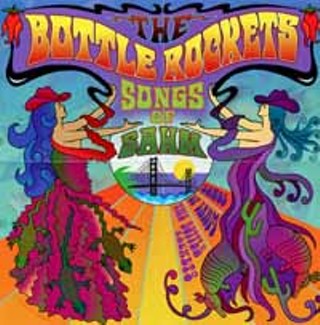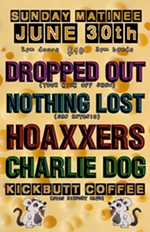Be Real
The Bottle Rockets and their songs of Sahm
By Jerry Renshaw, Fri., Feb. 15, 2002

Think of Doug Sahm and you think of Texas. Sure, there was his flirtation with San Francisco and the swampy Sir Douglas/ Huey Meaux days, but all in all, it still came right back to the Lone Star State, San Antonio, Austin, the Soap Creek Saloon, and the Armadillo -- at least in the consciousness of most people. You certainly don't think of the Sahm sphere of influence stretching as far as Festus, Missouri.
It all started one day on the front porch of Bottle Rockets head honcho Brian Henneman's house. The band had been on hiatus for about a year after both of Henneman's parents died within six weeks of each other.
"I inherited my parents' house, which wasn't necessarily a good thing since they still owed $30,000 on their note," explains Henneman. "A friend told me it'd be a year before I got all that shit cleared up. He was right."
The group's 1999 release, Brand New Year, had been given a thorough shellacking in the press and had gone nowhere commercially. It remains the band's least satisfying release as well. On top of that, the band was knee-deep in an unhappy record deal with Austin-based indie Doolittle Records.
"Compared to that, Atlantic was awesome," Henneman notes dryly, referring to the band's previous release, 1997's 24 Hours a Day.
After the sessions for Brand New Year were completed, Doolittle called in engineer/ producer Paul Ebersold (Sister Hazel, Three Doors Down) to give the album a rock-radio-ready remix. The result was a slicked-down effort that robbed the band of much of their gritty bar-band punch, selling out their signature twang for classic-rock Sturm und Drang. Without management in their corner, they went mano a mano with Doolittle until they were able to extricate themselves from the label unscathed.
Sometime later, one afternoon last spring, Henneman and Bottle Rockets' guitar player Tom Parr were sitting on Henneman's porch in St. Louis, playing guitars, drinking beer, and just generally shooting the shit. The band was still without management, and now without a record label, and just generally at drift. That's when Doug Sahm came up.
"Doug Sahm was one of our favorite guys," asserts Henneman. "We got turned on to him by our friend Scott Taylor back in '81 and had been listening to him all that time. He had been dead for quite awhile at that time and we still hadn't seen the proper tribute album to Doug. That's when we realized that if someone did put one together, they wouldn't ask us to be on it anyway. Our love of Doug had always been kinda stealthy and not really recognizable in the stuff we did."
As the afternoon wore on, Parr and Henneman considered the idea of pulling together their own tribute album. They mulled over various friends and compadres that could be roped in on the project: Jay Farrar, Steve Earle, Lucinda Williams. As afternoon progressed into evening, the logistical problems involved in such a project began to sink in. Soon, the guys had turned the corner, and what started out as hops-and-barley talk quickly evolved into the band doing the entire album themselves.
In no time at all, drummer Mark Ortmann was pitching the idea to Bloodshot Records ("He's the guy that gets up and does things," laughs Henneman. "He's Mr. Go-Get-It"), and a scant six weeks later, the album was in the can and ready to be submitted to the Chicago-based twang-banger indie.
"It was the swiftest thing that ever happened," notes a bemused Henneman. "It's almost like it didn't happen at all. It was insane, going from the worst record deal of my life to the best, and it all came from some little drunken dream on the front porch. It all got done, and I still can barely believe it."
For the Bottle Rockets, Doug Sahm was a musical staple, as iconic and important in rock history as Johnny Cash. Still, in considering songs for the CD, Henneman recalls a lot of discussion about which songs to cut.
"We were thinking we shouldn't go for the more famous songs of his, but then we realized that even his famous songs weren't really that famous," chuckles the singer.
Sticking close to home, the band hooked up with producer Lou Whitney in Springfield, Missouri. Whitney, sometime bass player for the Morells and the Skeletons, had worked with the band before, as well as with Robbie Fulks, the Del-Lords, Cowslingers, Dallas Wayne, and plenty of other like-minded folk. While settling into Whitney's the Studio, the band stumbled across another Sahm connection.
"Lou was telling us that Doug actually lived there [in Springfield] for a while," says Henneman. "He moved there to be close to his favorite pot grower."
Whitney's unobtrusive production style made the Bottle Rockets sound like a real live band for starters. There are no splashy, larger-than-life drum sounds or overwrought guitars ô la Nashville country, and no grubby straight-from-the-garage-to-your-trashcan sounds either. Instead, Songs of Sahm is clean and straightforward sonically, much like their mentor Sir Doug would have liked it.
In fact, there are a number of instances on Songs of Sahm ("Mendocino," "Sunday Sunny Mill Valley Groove Day") that the band sounds more like Doug Sahm than it does the Bottle Rockets. At other times, they call up the psychedelic swirl of "Song of Everything" or the rootsy mojo of "She's About a Mover" quite credibly, while still giving it the Parr/Henneman trademark yowl.
"We were just doing it by memory," asserts Henneman. "We didn't listen to the records or anything. We were just doing 'em the way we remembered 'em, and I'm surprised they came out as close as some of 'em did. What's funny is that after we were done, we put some of his stuff on because I thought maybe we'd come too close, but it's different enough."
Truthfully, it's all evidence of how deeply ingrained Sahm's stuff was for the Bottle Rockets, with most songs being nailed in one or two takes. Some bands learn Skynyrd, Boston, Thin Lizzy, or Bad Company songs and are cursed with them forever; no amount of drink or drugs (in fact, nothing short of a lobotomy) can obliterate their accursed chord changes from memory. The Bottle Rockets wrapped their brains around Doug Sahm some 20 years ago.
People in other parts of the country tend not to give the Midwest much thought, and when they do, images of flat landscapes, straight highways, and endless corn- and beanfields come to mind. Fewer people realize that part of the Midwest -- think Southern Illinois, Indiana, and Missouri -- have a sort of cultural identity crisis that aligns them much more with the southern half of the United States.
Just like in any other part of the country where things are rural and provincial, though, some folks seek out something different to break the stifling monotony of small-town life. For some, that means hunting down stuff by the Ramones or the Clash or even the Grateful Dead, for God's sake. For Brian Henneman, Tom Parr, and the rest of the Bottle Rockets, it meant trying to scare up some Doug Sahm.
Hearing Songs of Sahm, it's not hard imagining ol' Wayne Douglas hisself liking it. After all, it was Sahm who sang "you just can't live in Texas if you don't got a lot of soul," and the Bottle Rockets demonstrate that Texas doesn't have a corner on that particular idea. ![]()
The Bottle Rockets' Brian Henneman opens for Jay Farrar at the Mercury next Saturday, Feb. 23.








